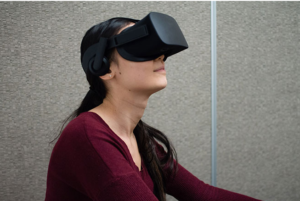 Lauren Schneider, clinical assistant professor of child and adolescent psychiatry at Lucile Packard Children’s Hospital Stanford, is exploring the impact of VR therapy in a pilot study called Project Brave Heart. The study aims to see if pediatric cardiology patients who participate in a pre-procedure virtual reality (VR) experience have less anxiety and stress than patients who don’t participate. The study includes sending a VR headset home with patients who have a scheduled cardiac catheterization procedure so they can learn about the procedure and practice relaxation techniques at home. Although these catheterizations are outpatient procedures, catheterization patients must undergo general anaesthesia. Doctors find the experience can cause stress and anxiety for patients, especially if they’re young.
Lauren Schneider, clinical assistant professor of child and adolescent psychiatry at Lucile Packard Children’s Hospital Stanford, is exploring the impact of VR therapy in a pilot study called Project Brave Heart. The study aims to see if pediatric cardiology patients who participate in a pre-procedure virtual reality (VR) experience have less anxiety and stress than patients who don’t participate. The study includes sending a VR headset home with patients who have a scheduled cardiac catheterization procedure so they can learn about the procedure and practice relaxation techniques at home. Although these catheterizations are outpatient procedures, catheterization patients must undergo general anaesthesia. Doctors find the experience can cause stress and anxiety for patients, especially if they’re young.
Although VR technology is expanding into medical settings, research into its health care benefits is in the early stages, and it’s believed that no one has studied its impact on children with congenital heart diseases. We are happy to see this research has been shared by multiple platforms. The full articles can be seen on the links below.
Stanford Children's Health Business Wire Virtual Reality Magazine